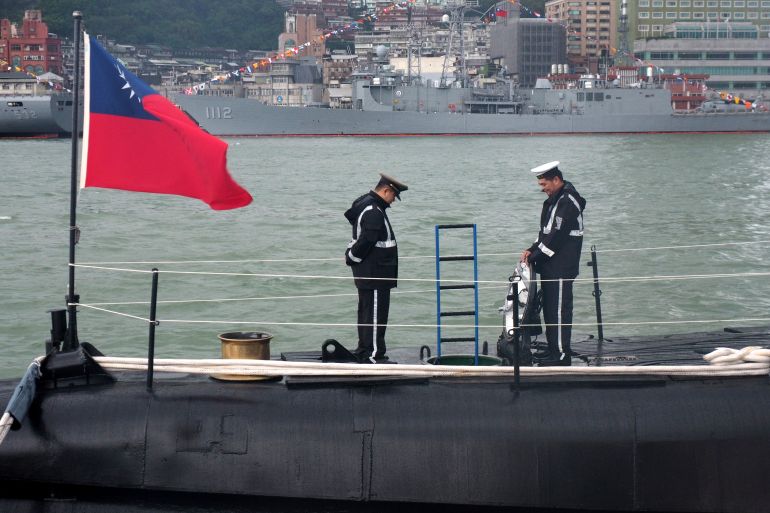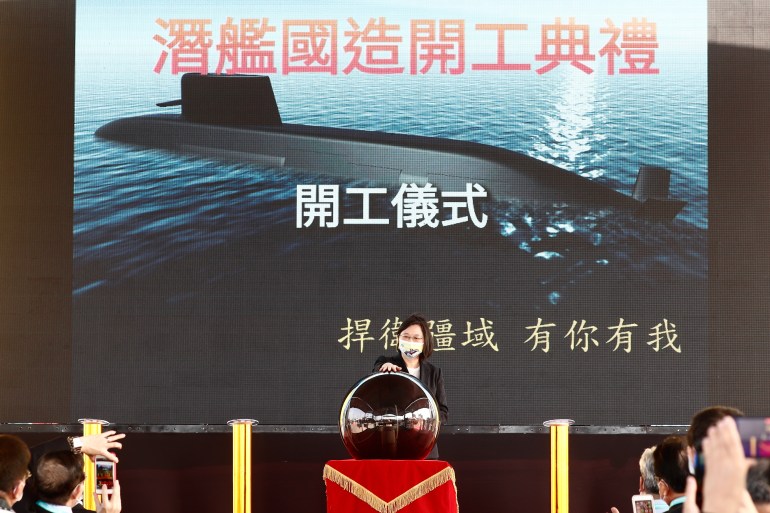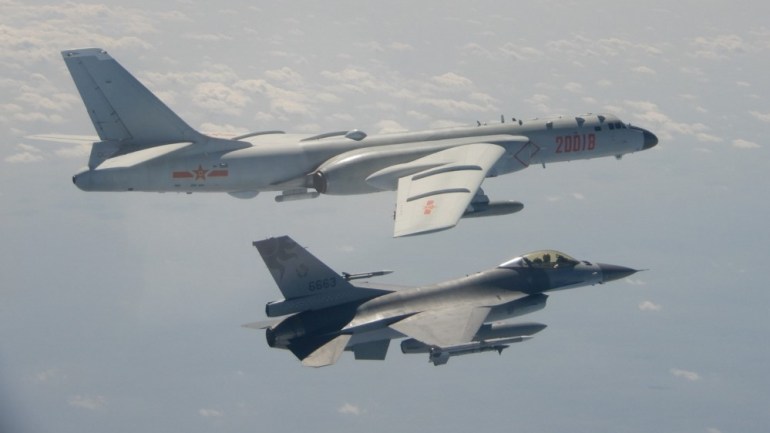Taiwan begins building first domestically produced submarines
Taiwan’s new programme will see the island build eight new diesel-powered attack submarines, the first of which is expected to be completed in 2024.

Taipei, Taiwan – Years in the making, Taiwan on Tuesday officially began work on its first domestically-produced submarine in an effort to beef up its coastal defences against any invasion from China.
Under the new programme, the self-ruled island, will build eight new diesel-powered attack submarines, which will substantially rejuvenate its fleet of two World War II-era vessels and two Dutch-made submarines built in the 1980s. The first submarine is expected to be completed by 2024.
Keep reading
list of 4 itemsTaiwan grounds F-16 fighter fleet after jet goes missing in drill
United States approves $600m sale of armed drones to Taiwan
China urges US to stop boosting ties with Taiwan
The submarines are the latest initiative by President Tsai Ing-wen to reorient the island’s defence policy towards preventing an invasion rather than focusing on the aftermath.
Her administration’s military shopping list reflects the change, and includes the purchase of missiles and drones from the US over traditional buys such as tanks and destroyers, said Michael Mazza, a visiting fellow in foreign and defence policy studies at the American Enterprise Institute.
“Taiwan needs to replace old equipment but at the same time, there’s recognition they cannot rely on those sorts of [weapons] platforms quite as heavily as they have in the past,” Mazza said. “They’ve been shifting to a more ‘asymmetric’ approach that focuses on things like survivability, a large numbers of munitions, mobility, and a focus on smaller survivable lethal platforms rather than F16s, tanks and destroyers.”
Submarines would play a critical role in deterring an amphibious landing by China’s People Liberation Army and also patrol the Taiwan Strait, a strategic 180km (90-mile) wide waterway that separates Taiwan from mainland Asia. Beijing claims sovereignty over both and has not ruled out the use of force to achieve its aims.


Taiwan has traditionally bought much of its weaponry abroad, particularly from the United States, but the decision to produce submarines at home probably got Washington’s approval. While the US does not maintain formal diplomatic relations with Taipei, it is the democracy’s defence guarantor under the Taiwan Relations Act.
Shortly before the groundbreaking submarine programme, the Reuters news agency reported that Rear Admiral Michael Studeman, a “two-star Navy admiral overseeing US military intelligence in the Asia-Pacific region” had visited Taiwan.
China’s ‘true intentions’
Building and buying new technology, however, is just one of the challenges facing Taiwan’s military, which has been beleaguered by old equipment and high maintenance costs due to the island’s hot and humid climate. Given its proximity to a hostile neighbour, the Pentagon has called Taiwan’s military spending “insufficient”, even as Tsai raised the 2021 budget to its highest-ever at $15.2bn.
Israel, by contrast, spent $20.5bn on its military in 2019, while South Korea spent $43.9bn and Japan $47.6bn, according to the Stockholm International Peace Research Institute.
Other issues include how deeply Taiwan’s military establishment is internalising the new “asymmetric” approach to defence, its willingness to reform and the need to increase both the number and quality of recruits to the armed forces.
“The problem here is you can’t just look at the military budget. The other thing you look for is force structure … conscription is a huge issue, so is the tax structure. You need to look at how much the military budget accounts for government spending,” said Liao “Kitsch” Yen-Fan, a freelance security analyst who works at the Institute of National Defense and Security Research in Taiwan.
Liao said Taiwan had cut its active-duty forces “to the bone” as many Taiwanese no longer wish to serve in its military.
Its reserves are also in trouble, according to experts. Although male citizens are required to perform military service, these days most only serve four months or opt for volunteering instead.
Reunification by force
While the threat of a military invasion has been less present in Taiwanese minds following decades of relative calm, Yao-yuan Yeh, an associate professor of international studies at the University of St Thomas in Houston, said China’s sharpening global power under Present Xi Jinping had begun to change minds.
While China has long said it hopes to achieve peaceful “reunification” with Taiwan, Xi has ramped up the rhetoric and not ruled out the use of force.
Many Taiwanese have also watched closely as China’s governing framework of one country, two systems was tested in Hong Kong and fell spectacularly apart amid a crackdown on protests and political rights this year. Beijing had suggested the same arrangement for Taiwan.
“The most important indicator of why Taiwanese people are more willing to defend themselves is because of Hong Kong. Now they have seen how much [China] can do to harm their freedom or the democratic system, and ‘one country, two systems’ is bogus,” Yao-yuan said.
“From 2019 to 2020 people have better [idea] of what are China’s true intentions. In the past, I don’t think they had a very clear idea about if the Strait were unified what would happen. But by seeing what has happened in Hong Kong and in Xinjiang, I think people really understand and they are not willing to lose their freedom.”